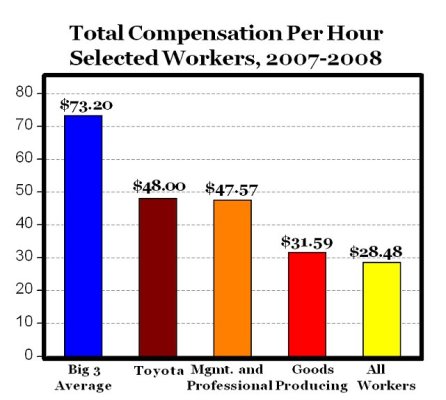chinaco
Give me a museum and I'll fill it. (Picasso) Give me a forum ...
- Joined
- Feb 14, 2007
- Messages
- 5,072
I think most people fall into a couple of camps on this issue. And their point of view depends a bit on the impact of the possible outcomes.
IMO - Our votes are based on most people perception of the outcome and their personal impact. If the poll were stated with an outcome identified... it show a bit more insight into their opinions.
I think we are in a severe crisis of which little is due to GM's recent decisions... Even if half of their cars were hybrids... they would be in trouble. Most of their woes right now are due to the havoc caused by financial institutions... including the oil bubble that was driven by speculation... mostly by large financial institutions.
I do not like the idea of a bailout... but if bailout = time to become stable and figure out next steps... I am for it. Especially if no bailout means a continued spiral downward.
The villains in this situation are our large financial institutions. Businesses that produce things are just swept up in it because they rely on the capital markets.
- If you were concerned that the immediate bankruptcy of GM (i.e., the domestic auto industry) right now would cause economic loss (spiral to an additional 10% unemployment that takes 10 years to recover) and securities market loss of another 30% - 40% from the current level... you are probably in favor of immediate triage.
- If you think is is a small blip and will not affect you... then you are against it.
- There are a few fools that would be ok with making them suffer the consequences even though it meant ruining themselves to stick with principle.
- The majority of people who are not directly impacted (investors... including us and people who will not lose their job) are oblivious. These are the poor, working poor or lower middle class that have no clue about what has occurred. To them this is just noise. Or they may be the super wealthy that have the resources to weather the storm.
IMO - Our votes are based on most people perception of the outcome and their personal impact. If the poll were stated with an outcome identified... it show a bit more insight into their opinions.
I think we are in a severe crisis of which little is due to GM's recent decisions... Even if half of their cars were hybrids... they would be in trouble. Most of their woes right now are due to the havoc caused by financial institutions... including the oil bubble that was driven by speculation... mostly by large financial institutions.
I do not like the idea of a bailout... but if bailout = time to become stable and figure out next steps... I am for it. Especially if no bailout means a continued spiral downward.
The villains in this situation are our large financial institutions. Businesses that produce things are just swept up in it because they rely on the capital markets.

